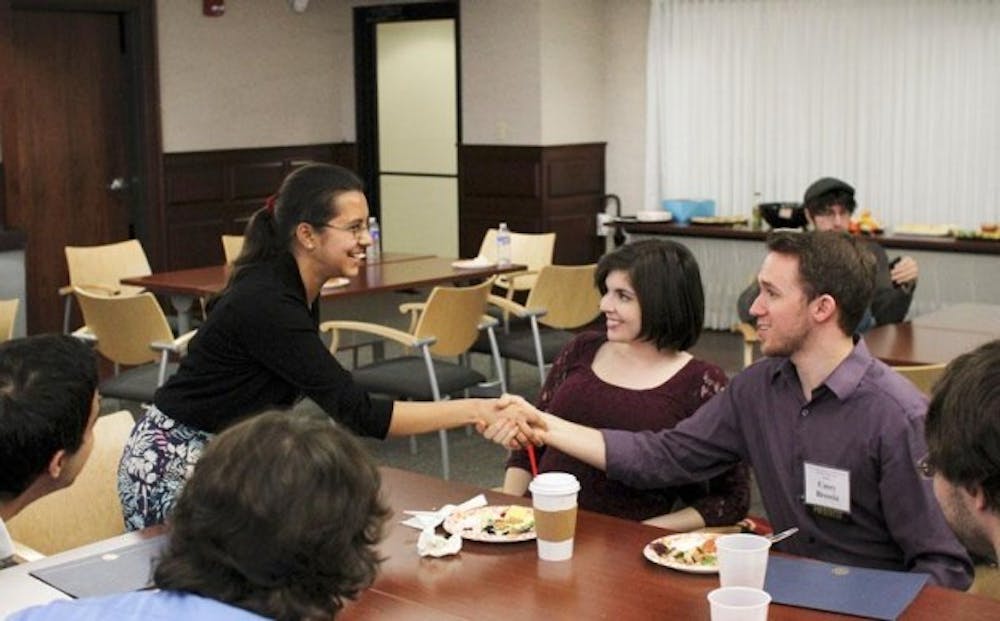Video games. Shakespeare plays. Factory farms. Episodes of Buffy the Vampire Slayer. What do they all have in common?
Violence.
Students from UB and Buffalo State College participated in Western New York's first-ever undergraduate conference on the humanities, "On Violence and Representation" Saturday. Students and other participants presented on the portrayals and implications of violence in literature, entertainment and public policy.
"There could hardly be a more pressing topic for consideration than violence and representation," said Graham Hammill, professor of English the department's chair, during his introductory remarks. "We see and hear of violence and the threat of violence every day. Whether in news reports of civil war in Syria, or the threat of war in Ukraine, in video games ... or in Shakespeare plays."
Following Hammill's introduction, two representatives from the Erie County Commission on the Status of Women, Dr. Karen King, Interdisciplinary Science and Engineering Partnership program manager in UB's chemistry department, and Sawrie Becker, commissioner of public advocacy for Erie County, spoke to the audience about domestic violence. Stressing the phenomenon as a local and global issue, King and Becker sought to raise awareness on domestic violence, emphasizing the importance of breaking the cycle of abuse toward women. The commission provides information for victims of abuse and raises money through fundraisers and community projects.
News of upcoming events, including the commission's plan to create a Tribute Garden in Tonawanda to honor lives affected and ended by domestic violence, set a powerful and passionate precedent for the presentations that followed.
"It's an increasing problem, violence against women on college campuses," King said. "And it doesn't always get talked about. It cuts across all lines, and it's not specific to race or class or a particular geographic area. This happens all over our community, and all over the world."
The prevalence of violence within relationships and all representations of violence - literary or otherwise - was the conference's primary concern. The ubiquity of violence in all of its forms intrigued and disturbed both presenters and audience members.
"But are all these representations of violence the same?" Hammill said. "Does the representation of violence spur on further violence, change the meaning of violence or even perhaps nullify its effects? These are essential questions."
The conference split into two concurrent sessions. The first session focused on violence found in Shakespeare plays, while the second featured three diverse presentations on violence in Buffy the Vampire Slayer, war and spirituality and video games.
Three presentations on chemically induced love, female violence and factory farms followed these sessions.
The Executive Steering Committee of Farhana Hasan, a senior linguistics and English major, Kapila Kapoor, a senior English major, Andrew Grabowski, a senior philosophy and English major, and Melissa Pavlovsky, an English major, gave their closing remarks to end the conference. Andrew Stott, dean of undergraduate education and director of the Honors College, presented the awards to the top three presentations.
Sushmita Gelda, a freshman interdisciplinary degree programs social sciences major, won the conference's first place prize for her presentation "Invisible Injustice: How Factory Farm Violence is Under-represented in the United States."
Gelda argued contradictory cultural ideologies, public policy loopholes, the meat industry's rhetoric and misrepresented nutrition facts contribute to a society indifferent and ignorant to the conditions of factory farms.
"Clearly, we know there's a problem," Gelda said. "But there is a refusal to acknowledge the connection between one's actions and the consequences of one's actions. Our desire to remain uninformed about an issue of moral controversy makes [us as a society] morally culpable."
Casey Brescia, a philosophy major at Buffalo State College, won second place for his presentation on the ethics behind a hypothetical love drug, entitled "Who Says You Can't Buy Love?"
Augustus Petko, a senior English major, won third place for his presentation on how orators employ subliminal themes of violence to manipulate their audiences, specifically in The Tragedy of Julius Caesar. The presentation, titled "Veiled Intentions; Rhetoric and the Influence upon an Audience," explored how violence within language is never addressed outright, but exists in allusion.
The conference concluded with audience members and presenters engaged in productive conversation prompted by the thought-provoking presentations. The UB English Club hopes this conference will be the first of many.
"It shows just how committed all [these students] are to research and scholarship," Hammill said. "This conference is a real testament to the kind of intellectual community that's taken shape here at UB."
email: features@ubspectrum.com
UB hosts WNY's first-ever undergraduate conference on the humanities
English Club hosts first of its kind conference

More
Comments




